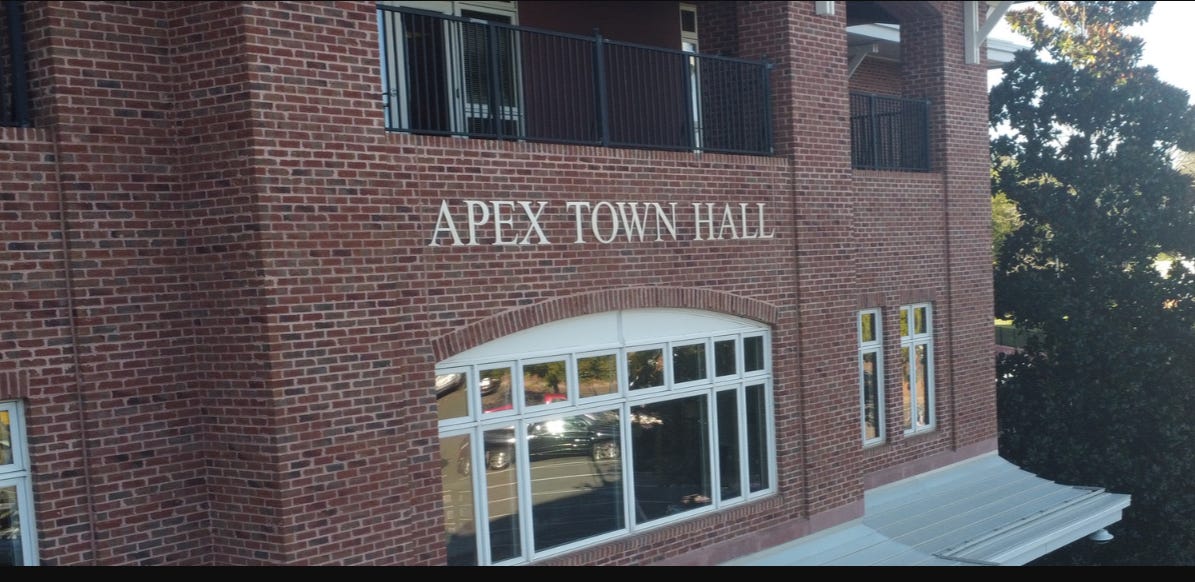Apex Town Council Supports State Bill to Protect Property Rights Amid Rapid Growth
Bill aims to protect long-established property rights from being overridden by changing local zoning rules.
Apex, NC, May 30, 2025 — In a show of support for local property owners amid a wave of rapid growth and development, the Apex Town Council voted unanimously on May 27, 2025, to adopt a Resolution (document) in favor of Senate Bill 587 (bill), state legislation that aims to protect long-established property rights from being overridden by changing local zoning rules.
The bill, titled "Clarify Nonconforming Uses," was introduced in the North Carolina General Assembly earlier this year to address a growing concern among property owners: that lawful uses of land or buildings can be restricted or eliminated when zoning laws change, sometimes decades after those uses were first established.
What Senate Bill 587 Would Do
Senate Bill 587 proposes several key changes to North Carolina law. It expands the definition of “nonconformity” to include not only land uses but also physical features such as structures, signage, fencing, and lighting that were legally established but may no longer meet current zoning codes.
The bill codifies vested rights for nonconforming uses, meaning local governments would be prohibited from applying new zoning rules to these existing properties without the property owner's written consent.
The legislation would also allow property owners to maintain, repair, or rebuild nonconforming structures, provided they do not expand them. A nonconforming use would retain its protected status unless it is intentionally and voluntarily discontinued for at least 24 consecutive months. That period would be paused in cases of litigation or declared emergencies.
Additionally, the bill places limitations on down-zoning by requiring owner consent before a municipality can reduce a property's development rights, unless the town itself initiates the change. These provisions will apply retroactively as of December 11, 2024.
A Local Example: Mrs. Thompson’s Story
To help illustrate the impact of the bill, consider the fictional but realistic example of Mrs. Evelyn Thompson, a long-time Apex resident. Mrs. Thompson has lived on a 5-acre property for more than 40 years. Her land includes a home, a detached garage, a workshop, and a roadside stand she operates seasonally to sell homemade preserves. All of these were built in full compliance with local zoning laws at the time of their establishment.
Over the past decade, as Apex has experienced significant growth, zoning changes have reclassified her area from rural to suburban residential. The new zoning regulations disallow roadside retail, impose stricter limits on impervious surfaces, and restrict the size and placement of accessory buildings. As a result, Mrs. Thompson’s stand and workshop are now considered nonconforming. Without the protections offered by Senate Bill 587, she might face restrictions or denial of permits to repair these structures in the future, or worse, be prohibited from reopening her stand after a brief closure.
If SB 587 becomes law, Mrs. Thompson would retain the right to continue her established uses without interference, rebuild her structures if necessary, and pause her business temporarily without losing her vested rights. Her situation represents many longtime property owners who fear being caught off guard by changing development priorities.
📝 Do you believe Senate Bill 587 will benefit Apex residents? Let readers know by taking the poll at the end of the story.
Why Apex Supports the Bill
The Apex Town Council’s resolution in support of SB 587 reflects a desire to preserve property rights and minimize regulatory uncertainty for homeowners and business owners alike. By clarifying and protecting nonconforming uses, the bill provides municipalities with a more transparent legal framework, which could reduce administrative burdens and potential litigation.
During the meeting, one council member summarized the value of the bill by stating, “This helps us avoid a lot of unnecessary legal conflict and gives clarity to what we can and can’t do with nonconforming uses. It protects long-standing homeowners while still allowing the town to plan appropriately.”
Supporters view the legislation as a means to provide consistency, predictability, and fairness for individuals whose properties might otherwise be subject to retroactive regulation. It also provides municipalities with a way to respect long-established land uses while planning for growth.
Concerns Raised About the Bill
Some observers have raised concerns about the broader implications of SB 587. Critics warn that the bill could limit a town’s ability to respond to growth by not allowing for updated zoning that addresses density, infrastructure needs, or environmental protections. Others suggest the law could make it harder to phase out outdated uses that no longer align with long-term community plans. There are also questions about whether the bill might discourage redevelopment in key areas by making older, noncompliant uses more difficult to retire.
Where the Bill Stands Now
As of May 30, 2025, Senate Bill 587 has passed the North Carolina Senate unanimously and is under review by the House Committee on Rules, Calendar, and Operations. Residents can follow the bill’s progress at the official General Assembly site: ncleg.gov/BillLookup/2025/S587
The Apex Town Council’s support signals a broader interest in ensuring that long-standing property rights are not unintentionally undermined as towns across North Carolina continue to evolve.

